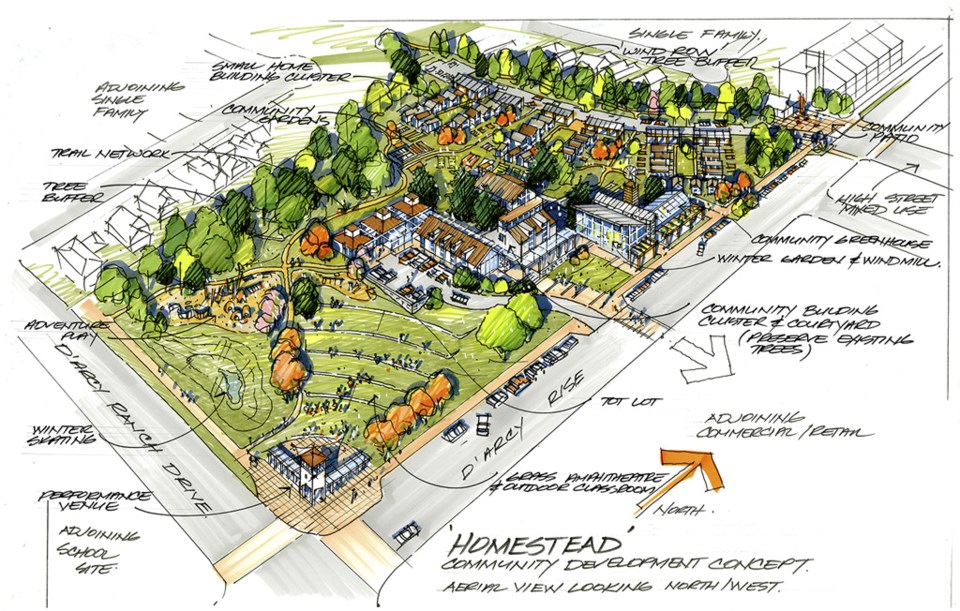Phase 1 of the Homestead Project was approved by council at its May 27 regular meeting.
In advance of the 2020 capital budget submission, the 2019-2021 capital project budget presented to council for the construction of the ecovillage component of the project as Phase 1 was approved, with a revised draft lease agreement to be presented to council by June 30.
To be built on the 10-acre Town lands in the D'Arcy neighbourhood, the Town’s contribution to the first phase of the project is $3.34 million of the total $8.46 million. The total high-level costs of the project are projected to be $14.10 million over the next 11 years.
Dawn Smith, environment and sustainability manager, and Angela Groeneveld, economic development manager, presented the project to council.
Groeneveld framed it as an opportunity to bring global investors here.
“The Homestead Project vision showcases Okotoks as a leader in innovation, holistic urban design and environmental initiatives, while integrating green technologies in an efficient design,” said Groeneveld. “This is far from status quo, this is a real opportunity here.
“We’re being globally watched right now, as administration as soon as this went public we were being contacted from all over. (…) Administration has tailored it to your corporate strategy and we collaboratively have customized this to Okotoks needs.”
With the global attention on the project, she said the Town won’t need to do any marketing, just tell the story, and that the project would grow the workforce and shift the non-residential tax ratio for the town through creating jobs and offering affordable housing.
Over 400 people have expressed interest, while over 60 people have indicated direct interest in living in the ecovillage, which suggests little to no risk for the town.
The environmental initiatives were a big draw for the project, and Smith offered several examples of what will be included, such as building efficiency with Green Build Gold standard or higher; renewable energy, such as solar panels on carports and main building; water re-use partnership with the University of Alberta; a community garden and aquaponic greenhouse; and sourcing local materials.
Coun. Ed Sands asked for clarification on the effect of the project on taxpayers, as the source of the funds would be coming from the capital reserve, not the operating budget, meaning the “impact on residential tax bill is essentially zero.”
Smith confirmed that the ecovillage and the majority of the project would be from the capital reserve, and that there may be some operating costs relating to the landscape areas that are wholly in the town’s area, as they would be park space. She emphasized that this operating cost to the taxpayer would be guaranteed regardless, as the land needs to be developed with or without the ecovillage.
“It’s not just about the houses, it’s the whole ecovillage concept which is also providing community services as a whole,” said Smith, who felt the project provides community services and facilities plus affordable housing.
Sands moved the motion to approve Phase 1, and said he strongly supported the project.
“It is controversial, there are people that are concerned that government should not be involved in affordable housing (…) The town demanded the candidates in the last election consider affordable housing, I’m not sure if the town demanded that we be landlords and I think this accommodates that,” he said. “We provide land that was given to us for municipal purposes, we are providing it for municipal purposes to do something innovative.”
Using the innovation of the Sustainable Okotoks pathway and the Drake Landing Solar Community coming to Okotoks because of that, Sands said that this is the next big step to being innovative.
“I can look at my residents that say ‘you’re spending my tax dollars’ and I am spending capital dollars and it’s not going to impact anybody’s tax bill this year, there is some money in the future for the other parts of it (for park spaces) as we move forward, we’re going to have to invest money in park space,” he said. “(…) The other side of it is ‘what if it fails?’ Council keeps the land, this land will always have value, I’m not afraid of putting something on there because it is our land.
“This is something I can look my community in the eye and proudly support this.”
Both Coun. Florence Christophers and Coun. Tanya Thorn spoke against the project, though they both appreciated the benefits of the project.
Christophers opposed the project based on a lack of provided details from the developer, while Thorn criticized the lack of a business case, and that there was nothing in the first phase that brought value back to the taxpayers, and spoke in favour of building the community spaces before the ecovillage.
For Sands, he likened the value of the ecovillage to the $15 million that was approved for the Pason Arena, and said while his family doesn’t play hockey and he doesn’t attend Oilers games often he wholeheartedly approved the project because it was an important community piece.
He said the affordable housing and business opportunities offered by the ecovillage make it similarly important.
[yop_poll id="50"]



